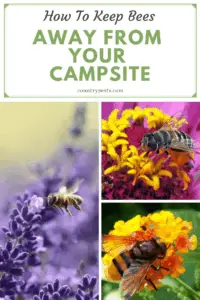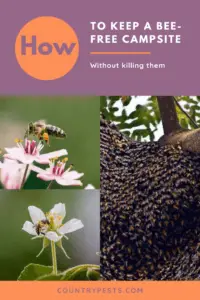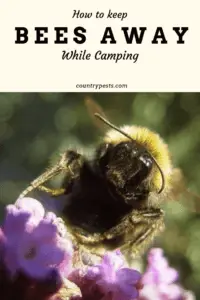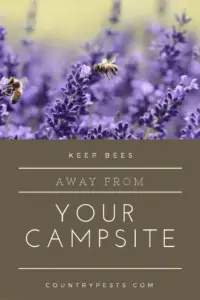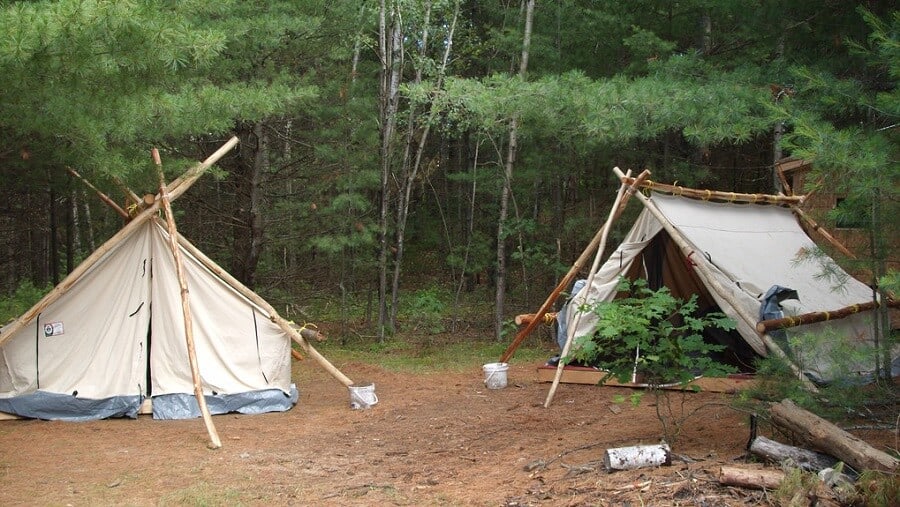Camping brings us closer to nature and brings a calm and relaxation into an otherwise busy life. It allows us to reconnect with those we love and make new memories. But, a bee sting or swarms of bees around the campground can make it difficult to fully enjoy the outdoors. Fortunately, there are several things you can do to prevent bees from bothering you while camping. With a little preparation, you can enjoy your time around the campfire without worrying about a bee sting or buzzing nearby.
15 Steps To Keep Bees Away From Your Campsite
Keeping bees away doesn’t have to be expensive, harmful to the bees, or dangerous to you. They only take a little effort and education. Let’s dive in.
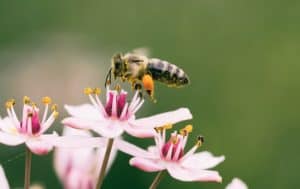
1. Prepare Before You Come To Be Bee-Neutral
Bees are attracted to two things: food and danger. They spend the whole of their lives looking for food sources or building the hive. Both activities take immense amounts of pollen from flowers. All bees flying around are looking for a food source.
The only exception to that is drones. Drones are male bees whose sole purpose is to mate with a queen. They don’t have stingers so they pose zero threat to you.
Bees are not attracted to the scent of people or animals. They are attracted to things that look or smell like flowers.
This is important to understand because packing the right stuff is important to keep the bees at bay while you are camping. Be conscientious about what you take on your camping trip or hike and you will appear neutral to bees and they won’t bother or care about you. Be intentional about the meals you plan.
2. Pack Fragrance-Free Products
Bees don’t generally care about people. Scents from lotions, deodorants, shampoos and other hygiene products can attract bees through the fragrance. Artificial flavorings are often more concentrated and stronger than natural scent so they attract bees and other insects away from natural food sources.
Pack products that don’t have added perfumes to them. Buy hypoallergenic products because those products tend to avoid artificial perfumes.
Purchase biodegradable products that won’t harm the environment while you are camping. Those products generally only use natural products and won’t be as strongly scented. Buy odor free shampoo, deodorant, wipes, lotions, toothpaste, mouthwash, and other products. Pack with mindfulness around what types of scents will attract bees. Be especially careful to pack scent-free items if you’re allergic to bees.
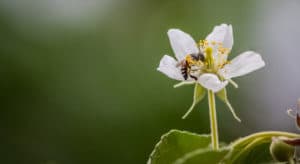
3. Avoid Packing Bright Colored Clothing
Since bees spend nearly all their time searching for food, pack clothing items that don’t resemble their food sources. This includes flowered prints and tablecloths.
It also includes clothing with bright contrasting colors. Bees can see ultraviolet light so neon colors, bright yellows, reds, greens, and oranges are more visible to them than other colors.
Avoid packing your vibrant, bright clothing. Check out this photography to see how bees see flowers.
Red looks like black to bees, which looks like black bears.
Avoid all-brown clothing a well. Bees associate brown with bears and may think that you are a predator out to steal their honey. This can make an otherwise mellow bee more aggressive.
Instead, opt for more pastel coloring or clothing with only a few colors on it. Neutral, light colors are a good option for camping clothing.
Cotton is also a good cloth option. Don’t wear clothing that is super tight or super loose. Tight clothing can catch a bee in it while loose clothing can do the same.
Back some long sleeves, pants and tennis shoes. You don’t need to wear them consistently. But, having a couple of clothing items that you can do to help protect your skin from bees can be helpful. It gives you a backup plan if bees come out in swarms.
Likewise, tennis shoes are helpful because bumblebees hive in old animal burrows. They are more likely to be crawling around on the ground than other types of bees. Plus, they don’t have barbs on their stingers so they can repeatedly sting without dying. You don’t want to step on a bumble bee with sandals!
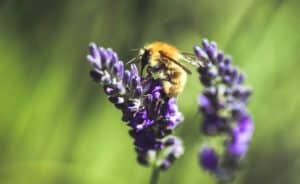
4. Choose A Campsite That Won’t Attract Bees
When you set up camp, be sure to choose an area that is less likely to have bee traffic through it. Look for beehives. Honey bees like to set up their hives in the hollow of old tree trunks. They build hives from the branches of trees, rock outcropping, and bushes.
Check the area for signs of bees or beehives. Watch for an abundance of flowers or fruits. If bees are attracted to the area around your campsite, it will be harder to keep them away. Bees can travel several miles to find food so be careful of where you choose to camp.
Try to find a campsite that is a little bit away from flowering bushes and wild fruit.
Another thing to watch for are smaller areas of water. Bees need a water source and are attracted to water. Little pools of water, small ponds and other areas with standing water can attract bees.
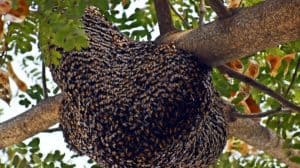
5. Use Sugar Water To Entice The Bees Away
As soon as you set up camp, set up a bee sweetener to entice bees away from your campsite. Because bees do fly many miles and make many trips to the hive, this can create a sweet spot for them that keeps them away from your activities.
Plus, bees communicate with each other. When a bee finds a sweet food source she returns to the hive and through the bee dance, communicates how far, how sweet, and where the food source is.
That means that if bees are in your area, they will be drawn to the greater food source. Setting it out as soon as you get there gives the bees time to communicate and go after that food source before they notice you or your food.
Make the bee sweetener by taking a quart soda bottle. Add fruit peelings such as bananas, apple cores, or peach skins. Don’t use citrus fruit. Add 1 cup of sugar. Add water halfway up. Tie the soda bottle from a tree. Be sure to hang it away from your camp. Even many yards away will be helpful because that distance isn’t far for a bee to fly.
Keep the soda bottle with liquid in it the duration of your trip.

6. Start The Campfire Before You Start Cooking
Whether or not you are using a campfire to cook your food, start a campfire before you fire up the grill or Camp Shef.
The presence and smell of smoke activates a stress hormone in bees. This hormone compels bees to look for survival. That means that bees want to stay away from the smoke. Starting a campfire helps to ward off bees from your campsite.
It also helps to cover the odor of cooking food and other smells that can attract bees.
7. Plan Your Meals To Bee Smart
Certain foods attract bees more than other foods. When you go camping, plan foods that are less likely to bring buzzing visitors to your campsite.
Bees are attracted to the smell of barbeque sauce. Other sweet sauces that are combined with cooking meat is also attractive to bees.
They are also attracted to sweet sugary drinks. Soda, pop, and juice will all attract bees. Avoid other foods that have a sugary smell.
Vegetables, grilled chicken, and pasta are generally ignored more often by bees. This will be truer if you have already provided them with a sweet drink when you arrived.
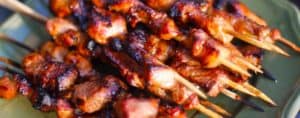
8. Use Bee Repellent Or Mask Your Sweet Smells
Some smells repel bees from an area. Take precautions to cover the sweet scents around the camping aerial. Sometimes it isn’t possible to completely eliminate sweet smells in the products that we use. Even dish soap can come with artificial flavorings.
Certain plants smell bad to bees. It will help if you are aware of what types of bees are common in the area you are camping. For example, bee balm smells bad to honey bees but will attract bumblebees.
Generally speaking, the following plants will repel bees.
spearmint leaves tend to repel leaves, but mint flowers will attract them. Be aware that the Western honey bee loves mint leaves.
Eucalyptus tends to be strong smelling and is popular as a bee repellent. The most effective species is Lemon eucalyptus.
Citrus peels. Many insects and wild animals avoid the smell of citrus because of its pungent smell.
Cucumber peels have a chemical in them that tastes bitter to bees (and other insects). As a result, bees are not attracted to the smell of cucumbers. Since cucumbers are healthy for people, have them out to eat with your meal, but keep the peels on a plate while you are eating to push the bees away.
Garlic is lethal to bees. As a result, the smell of garlic is usually effective in driving bees away. Use raw garlic on your table and interspersed it among your food. Or, use it in cooking to mask the other smells of your food.
Vanilla extract smells bitter to bees and they will avoid it. If you’re tasked vanilla extract sans the sugar, you already know that. You can leave out a container of vanilla extract on the picnic table. You can also use it as a bee repellent.
Simply add 1 TBSP of vanilla extract to 1 cup water and dap it over your skin. While it smells pleasant to us, vanilla is very bitter to bees.
Some people recommend marigolds as a bee deterrent. This is because marigolds are usually yellow or orange colored and the smell affects other animals and plants. But, marigolds don’t bother bees, they just usually prefer other flowers if they have choices. Bees will collect pollen from marigolds if they are the only flower around so be careful bringing a potted plant camping with you.
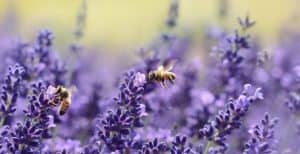
9. Cover Food With Tight-Fitting Lids, Even While Dining
Help prevent bees from smelling your sweet food, fruits, and desserts by keeping a tight lid on your containers. If you bring sweets, bring them in pans that have lids.
Saran wrap is better than nothing, but even cling wrap will keep the smell contained better. A tight-fitting lid is best. Food items that are sweeter or more pungent can be kept in your card when they aren’t being eaten.
If the bees don’t smell it as much or as strong, they are less likely to investigate and bring others from the hive.
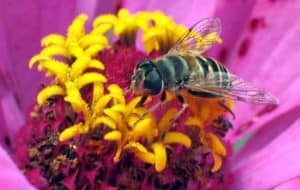
10. Contain All Trash And Food Waste
Leftover food, apple cores, fruit skins, and other food waste all tend to increase in the smell as it ages. Even a couple of hours warming in a garbage bag can mix many sweet smells that will bring bees to investigate.
So, keep your trash closed up tight. Before you go camping, consider buying an outdoor trash can with a tight-fitting lid. This will help to keep out bees. It will also help to keep out squirrels, raccoons, and other animals. (Don’t depend on it to help with bears).
Or, keep your trash bags locked in your car. The car provides an extra layer between the smell of the trash and bees.
Throw away your trash in the public dumpsters provided at many campgrounds. Don’t collect large amounts of trash near your tent or RV.
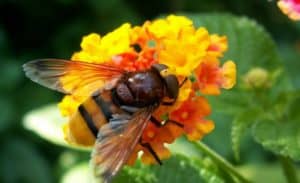
11. Trick Bees By Blowing Up Brown Paper Bags
Bees tend to stay away from foreign beehives. They don’t want confrontation or harassment.
The use of brown paper bags blown up balloon-style is a local tradition in many areas. It is used to keep bees away from the area. Simply bring along 5 or 6 paper bags and hang them in a circle around the area you are camping. This will help to intimidate the bees in the area.

12. Stay Calm When You Encounter Bees
Bees are the only insect that can recognize individual human faces. They can also identify individual bears. This survival skill is vital in protecting the colonies.
If you have a been investigating the area, stay calm. It is vital to not become animated, loud, or scary to the bee. You don’t want the bee perceiving you as a threat or bringing friends to fight you down.
This will only increase the aggression that bees will react with.
Bees are generally not aggressive. The honey bee and bumblebee are both very mild bees that generally leave people and animals alone. In the southern US and Mexico, the mild strains of bees have bred with the imported African bee, which is more aggressive. As a result, you may encounter more aggressive bees in the south than you will in the north.
But, either way, if you remain calm and move with slow deliberate movements, you can avoid startling the bee and making yourself a threat to it.

Photo Credit: http://vis-uv-ir-flower-photos.blogspot.com/
13. Use A Screen Tent Around The Picnic Table
Bottomless screen tents make a great addition to camping supplies. The tent can be put over the picnic table and used to keep not only bees, but mosquitoes, flies, wasps, and other insects away from you while eating.
This will help to keep your food safe from insects who want to much on it and allow you some insect-free time while enjoying your meal. It won’t keep bees away from your campsite but will provide you with a safe zone.
14. Respect Nature And Bees
Generally, campers enjoy the outdoors and respect the creatures and insects found there. But, sometimes it still becomes overwhelming to deal with pests. Understand that bees are vital to the food chain and critical to our food sources.
Bees pollinate over 75% of the world’s food, but they are being killed off in record numbers by pesticides, human development, and people with little tolerance for their presence.
Bees don’t hang around to bother you or ruin your camping trip. They are simply looking for a way to survive. They need pollen to create honey and beeswax for their hives. They spend their entire lives preparing for the winter months.
Respect the good that bees do and try to avoid killing or harming local bees when you go camping.

Photo Credit: Thomas Flickr
15. Enjoy Camping
Above all, have a great trip. With a little preparation, even those allergic to bees can enjoy the outdoors healthily and safely. Nature has so much to offer us and even the smallest of insects can teach us a lot about the world and ourselves.
Related Questions
What If I’m Being Bothered By Wasps?
Wasps are more aggressive than bees but generally will try to leave other people and animals alone. Be aware that wasps won’t die when they sting you so if you provoke an attack, either on purpose or by accident, you are likely to get stung multiple times. Wasps can also swarm, which means that the entire colony can attach you.
Wasps can be identified from longer, larger bodies. Their body shape is also different and is more hourglass shaped than bees. Wasps build paper nests.
If wasps are in dating your campsite, you can consider trapping and killing them. Use the sugar water concoction, but add dish soap to it. The dish soap will make their wings sticky and make them drown in the water.
Be careful about attracting and killing wasps because bees can be attracted to the same smells.
Why Do Bees Sting?
Bees only sting for defense. They sting to defend the hive and occasionally a single bee will sting to defend herself. (Male bees don’t have stingers). Most bee species are not aggressive.
If a bee feels threatened near the beehive, they will alert the guard bees that stand guard at the hive entrance. These guard bees will send the troops out. Thousands of honeybees can swarm out of a beehive to defend the hive and the queen bee against a perceived threat.
Don’t attempt to collect honey from wild hives. Don’t play with the hives or threaten them in any manner.
Feature image photo credit: Mathew Ingram Flickr
[post-carousel id=”364″]
